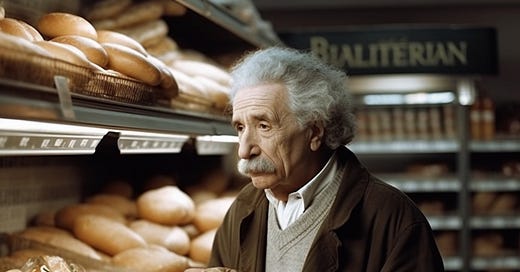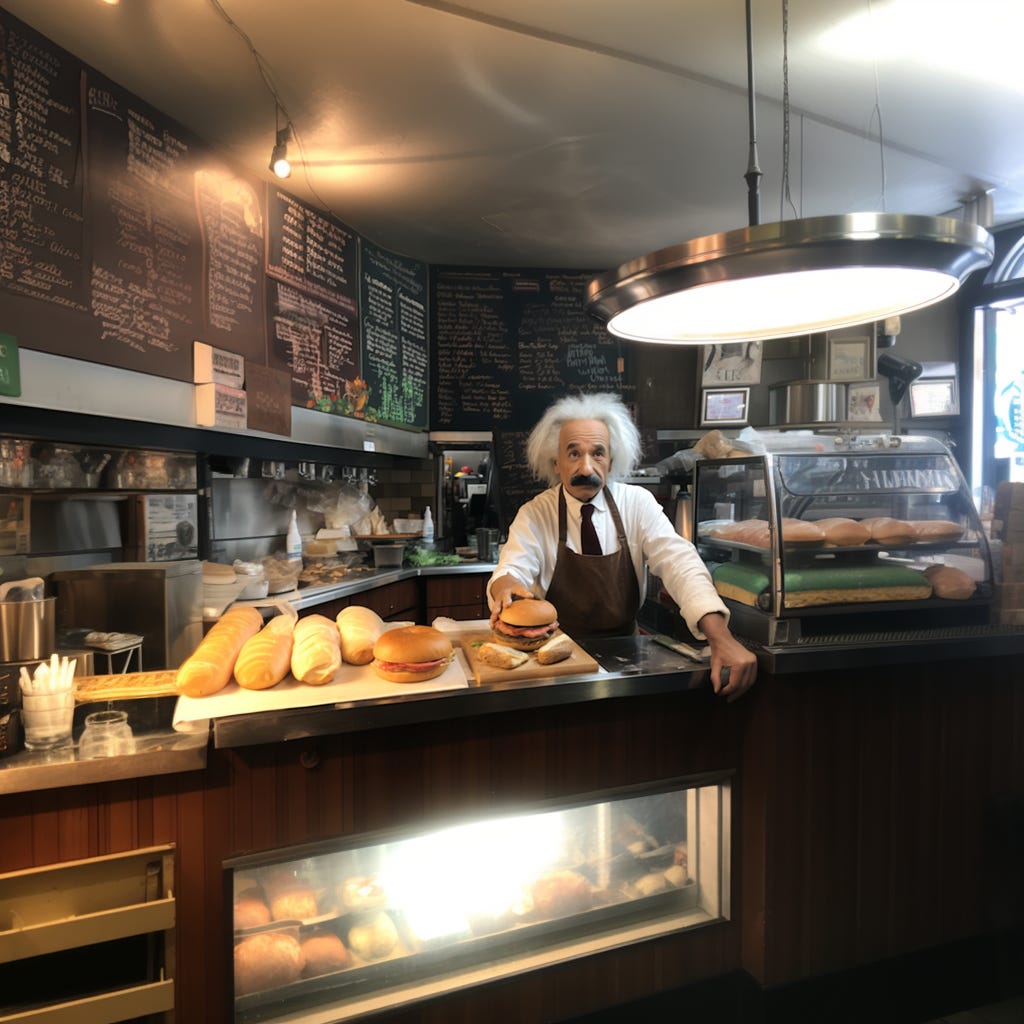The Theory of Food Relativity
When it comes to food values, eaters have splintered into myriad food tribes, each with their own set of values and facts that blur the distinction between objective and perceived reality.
Einstein’s theory of relativity states that the passage of time moves differently for two people moving at drastically different speeds. I won’t go into the mathematical details of how this is true, but it’s been widely accepted and experimentally verified that a person’s perception of how fast time passes is a function of their point of view. As the theory’s name suggests, the perception of time is relative to how fast and in which direction the observer is moving through the universe.
When it comes to people’s food beliefs there is an analogous relationship: perceptions about food’s flavor, nutrition, sustainability, culture, and politics are rarely absolute and depend on the vantage point of the eater. There has not and never will be a single “right” way to eat. There are myriad ways to eat that accomplish certain goals, like for sustenance, health, performance, tradition, or just pure pleasure. But there is no such thing as a universal “right” way, just the “right” way for each individual trying to accomplish something specific.
The 20th century gave us the rise of mass brands where companies could create food and beverage products that were meant to appeal to everyone. Mass appeal was a necessary condition to realize the economies of scale at the agricultural and manufacturing level to make a low-margin, high-volume business like food make sense.
But since the internet flattened the world and connected us all, the idea of mass appeal is less relevant than ever. Think about what it was like in 1960 if you were an aspiring vegan living in the middle of nowhere. It was probably lonely and difficult to eat that way and you most likely abandoned the idea and ate meat along with everyone else in your community. Contrast that with today where digital communication, online communities, and direct-to-consumer food shopping can make a physically isolated vegan feel connected with and validated by a global community of likeminded eaters. It doesn’t matter where you live or what your beliefs are, the internet enables all of us to find “our people,” virtually and physically.
This connectivity helped to usher in the rise of food tribes, where eating habits and belief systems outside of the mainstream could thrive. From eating keto to raw to paleo, food lifestyles that may have been considered fringe were elevated to niche status at minimum. Brands, big and small, could easily find these niche consumers and an ocean of new food products have launched in the past 20 years to serve just about any kind of eater. For the most part, this is a good thing, as no one has to settle for the mainstream if they don’t want to and each person’s needs can be met on an unprecedented level of granularity.
However, like in the political realm, niche food ideas on the internet can quickly metastasize into fringe points of view, far to the left or right of center. From digitally savvy charlatans like the Food Babe incorrectly conflating Subway’s bread with yoga mats to the Liver King extolling the virtues of eating raw liver and testicles on TikTok, it seems that having objective truths in food are a thing of the past. In this world, real facts don’t carry as much weight as whatever an influencer can make you feel is real through fear, aspiration, or both. Incidents of food misinformation will only escalate in the age of generative AI, so it’s crucial that we develop ways for people to become more street smart about online food information.
A lot of this sentiment is rooted in a rejection of institutions like Big Food, western medicine, or government. Influencers prod their followers to “do their own research” and can turn reasonable skepticism about establishment ideas into full on conspiracy theories and junk science. Look, Subway’s bread is far from my idea of good bread, but it is absolutely not made of yoga mats. As much as fallacy ridden, science illiterate arguments like the Subway bread thing infuriate me, it’s highly improbable that I alone will change someone’s mind about what they put into their body. One person’s snake oil is another’s panacea, and the validity of a food idea is relative to your worldview.
It doesn’t stop with pseudoscientific nutritional advice like only buying foods with “ingredients you can pronounce” (by that logic, is arsenic healthier than xanthan gum?). Food has always been political and can symbolize socioeconomic classes, personal identities, colonialism, freedom, and more. Remember when Republicans renamed French Fries to “Freedom Fries” in 2003 at the Congressional cafeteria as a response to France’s opposition of the war in Iraq? Or the recent boycott of Bud Light from conservative groups upset by the beer’s collaboration with Transgender TikTok star Dylan Mulvaney? Food has never just been about the food itself.
For as many political viewpoints there are, there are probably just as many food and drink choices that sync with those values. Black Rifle Coffee is a coffee company founded in 2014 by three veterans that sells beans with names like, “AK-47 Espresso,” “Thin Blue Line,” and “Silencer Smooth Roast.” In 2021 they pulled in about $240 million in sales and more than half of their employees are military veterans, reservists, or military spouses. The company was founded in part as a conservative alternative to Starbucks and their “latte liberals.” When Starbucks vowed to hire 10,000 refugees in protest to Trump’s 2017 executive order banning visas for applicants from several majority Muslim countries, Black Rifle’s CEO appeared on Fox & Friends to announce that he was going to hire 10,000 veterans. “The company billed itself as pro-military, pro-law enforcement and ‘anti-hipster’” notes a 2021 New York Times profile.
Regardless of your personal politics, I think companies like Black Rifle Coffee represent a big part of the future of food for all viewpoints. In the 1970s, Big Food wanted to “buy the world a Coke,” but today it wouldn’t be that simple. There are simply too many different consumer tastes, nutritional needs, and political viewpoints to get everyone to agree to that single red can of Coke. The barriers to entry to starting your own successful food or beverage brand are still relatively high, but lower than they ever have been. If someone doesn’t agree with the flavor or politics of Starbucks, Bud Light, or Coke, they can simply start their own company that exemplifies their liberal, conservative, or other views. Black Rifle is a counterpoint to Starbucks and going forward it’s highly plausible that we’ll see brands in every category representing the full range of identities in the world.
I don’t have a good answer for if the splintering of the food and beverage industry along ideological lines is good or bad for society. Maybe it just is what it is. Deep down, I wish we could all unite and find more common ground, but with how polarized and vitriolic the political discourse in the world has gotten, maybe it’s best if we do our own thing for a while until things hopefully calm down, at least when it comes to picking a coffee brand.
And when we’re just talking about personal taste and nutrition, I don’t see much reason for us to have to agree on what’s delicious and healthy for everyone. Sure, that can erode longstanding food traditions like everyone in the family eating from one Thanksgiving turkey, but it can also create new traditions that are more expansive and potentially more interesting. Unlike politics and government where you have to abide by laws regardless of if you agree with them or not, no one can or should stop an individual from making their own decisions about what to eat, provided it doesn’t harm anyone else (although the part about not harming anyone else is increasingly convoluted for many foods, like the attribution of massive greenhouse gas emissions to the meat industry). Food is personal and in a world where it can sometimes feel like nothing is in your control, taking command of your own diet is empowering and important.
But when does the aggregate of all our diverse personal choices add up to something that affects everyone? Is there a limit to how self-contained the impact of our personal choices can be? Even though the theory of relativity says that our perceptions of certain physical events are dictated by our personal situations, it also says the speed of light is a universal constant and everyone experiences it in the same way. We can and should all have personal freedom when it comes to our food choices, but we need to acknowledge that like the speed of light, there are physical laws of nature in food and agriculture that don’t care about our opinions of them in order to be true. We may all exist in our own food tribes that we connected to via the internet, but our tribes are all still connected to a single planet that feeds us.
That is, until we colonize Mars and start a new civilization. But somehow, I have a feeling there’ll be a Starbucks and a Black Rifle Coffee there too.
—
Footnotes
3 Recent posts from my Substack
3 Highlights from my current reading list
Big Food Should Be ESG’s Next Target by Merryn Somerset Webb - Bloomberg
Why aren’t we more scared of the climate crisis? It’s complicated by Maggie Mertens - The Guardian
How Consumer Propaganda Changed America by Epic Economics - YouTube
My email is mike@thefuturemarket.com for questions, comments, consulting, or speaking inquiries.








